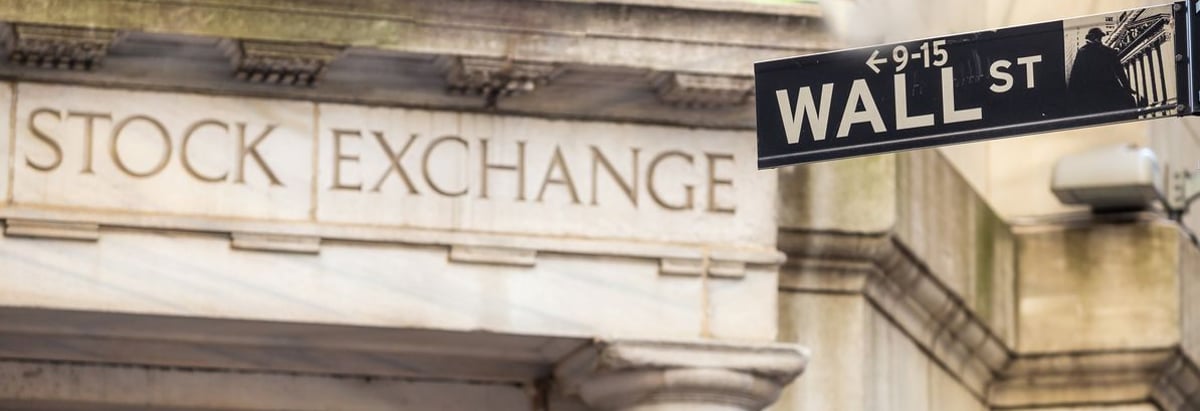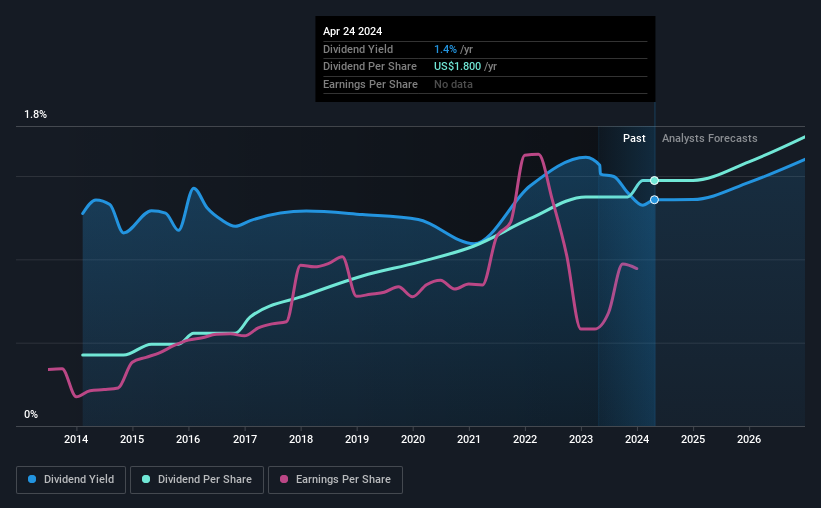- United States
- /
- Capital Markets
- /
- NYSE:ICE
Intercontinental Exchange (NYSE:ICE) Has Announced A Dividend Of $0.45

Intercontinental Exchange, Inc.'s (NYSE:ICE) investors are due to receive a payment of $0.45 per share on 28th of June. Even though the dividend went up, the yield is still quite low at only 1.4%.
Check out our latest analysis for Intercontinental Exchange
Intercontinental Exchange's Payment Has Solid Earnings Coverage
The dividend yield is a little bit low, but sustainability of the payments is also an important part of evaluating an income stock. The last dividend was quite easily covered by Intercontinental Exchange's earnings. This means that a large portion of its earnings are being retained to grow the business.
Looking forward, earnings per share is forecast to rise by 42.5% over the next year. Assuming the dividend continues along recent trends, we think the payout ratio could be 34% by next year, which is in a pretty sustainable range.

Intercontinental Exchange Has A Solid Track Record
The company has an extended history of paying stable dividends. Since 2014, the annual payment back then was $0.52, compared to the most recent full-year payment of $1.80. This works out to be a compound annual growth rate (CAGR) of approximately 13% a year over that time. Rapidly growing dividends for a long time is a very valuable feature for an income stock.
Intercontinental Exchange May Find It Hard To Grow The Dividend
Investors who have held shares in the company for the past few years will be happy with the dividend income they have received. Earnings per share has been crawling upwards at 3.6% per year. Growth of 3.6% per annum is not particularly high, which might explain why the company is paying out a higher proportion of earnings. This isn't bad in itself, but unless earnings growth pick up we wouldn't expect dividends to grow either.
Intercontinental Exchange Looks Like A Great Dividend Stock
Overall, we think this could be an attractive income stock, and it is only getting better by paying a higher dividend this year. Earnings are easily covering distributions, and the company is generating plenty of cash. All in all, this checks a lot of the boxes we look for when choosing an income stock.
Investors generally tend to favour companies with a consistent, stable dividend policy as opposed to those operating an irregular one. Still, investors need to consider a host of other factors, apart from dividend payments, when analysing a company. To that end, Intercontinental Exchange has 2 warning signs (and 1 which is potentially serious) we think you should know about. Is Intercontinental Exchange not quite the opportunity you were looking for? Why not check out our selection of top dividend stocks.
New: AI Stock Screener & Alerts
Our new AI Stock Screener scans the market every day to uncover opportunities.
• Dividend Powerhouses (3%+ Yield)
• Undervalued Small Caps with Insider Buying
• High growth Tech and AI Companies
Or build your own from over 50 metrics.
Have feedback on this article? Concerned about the content? Get in touch with us directly. Alternatively, email editorial-team (at) simplywallst.com.
This article by Simply Wall St is general in nature. We provide commentary based on historical data and analyst forecasts only using an unbiased methodology and our articles are not intended to be financial advice. It does not constitute a recommendation to buy or sell any stock, and does not take account of your objectives, or your financial situation. We aim to bring you long-term focused analysis driven by fundamental data. Note that our analysis may not factor in the latest price-sensitive company announcements or qualitative material. Simply Wall St has no position in any stocks mentioned.
About NYSE:ICE
Intercontinental Exchange
Engages in the provision of market infrastructure, data services, and technology solutions for financial institutions, corporations, and government entities in the United States, the United Kingdom, the European Union, Singapore, India, Abu Dhabi, Israel, and Canada.
Average dividend payer with mediocre balance sheet.

